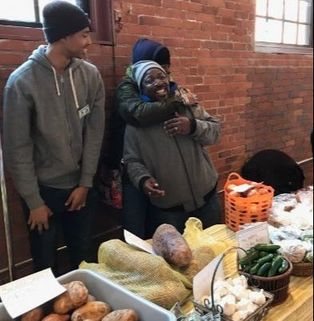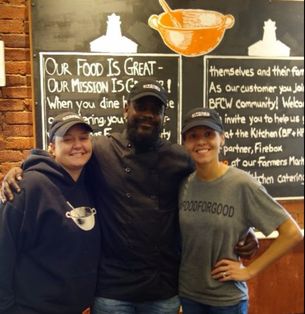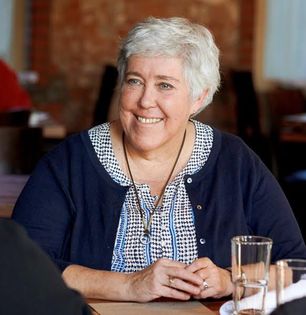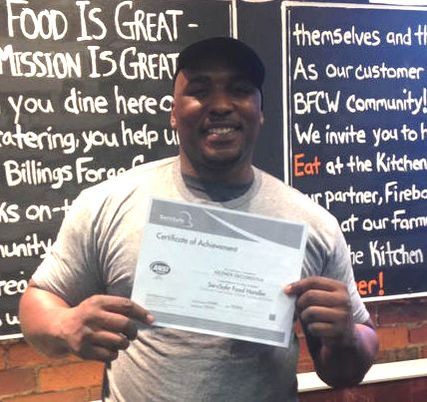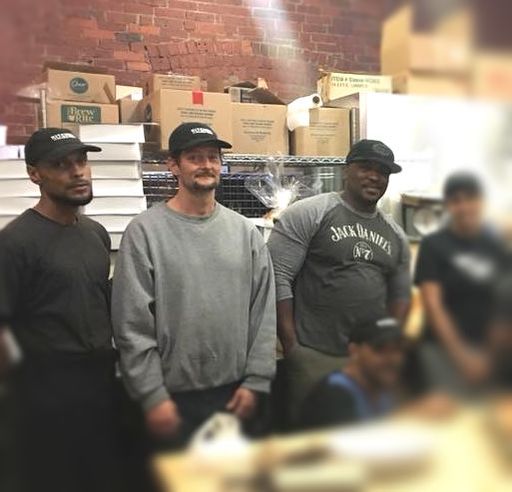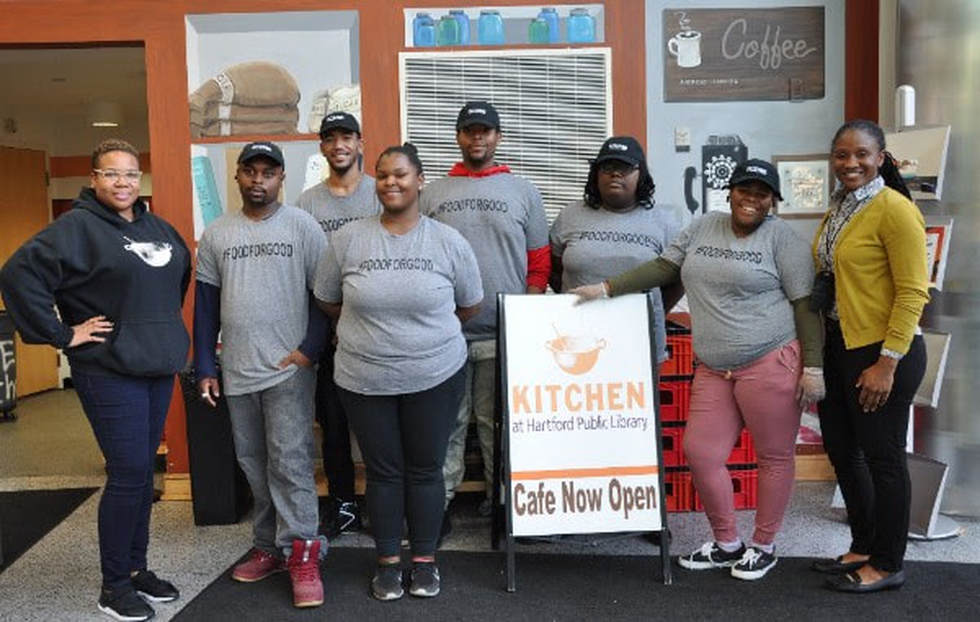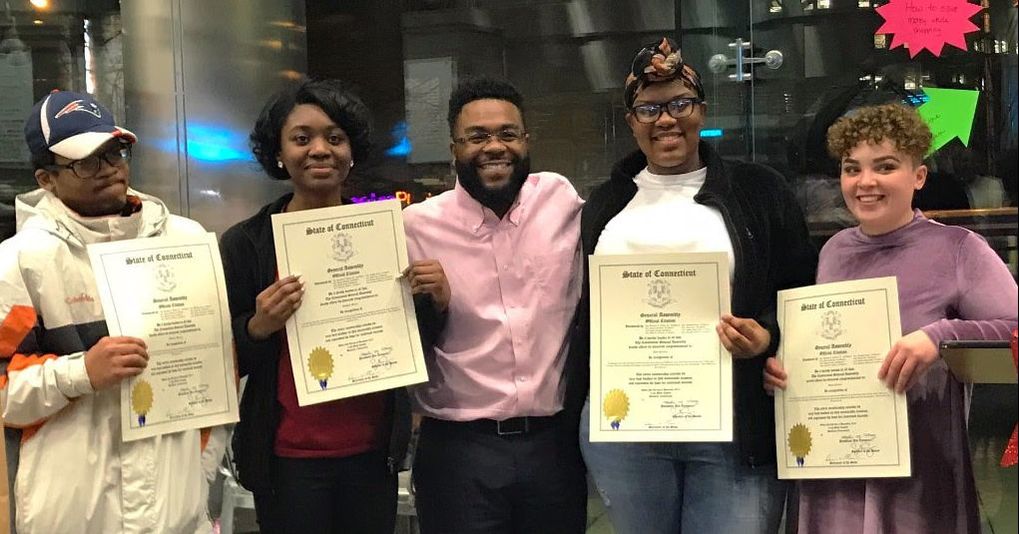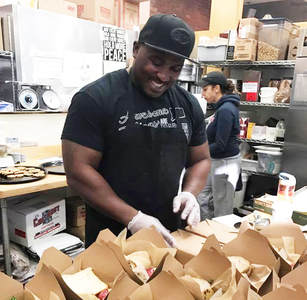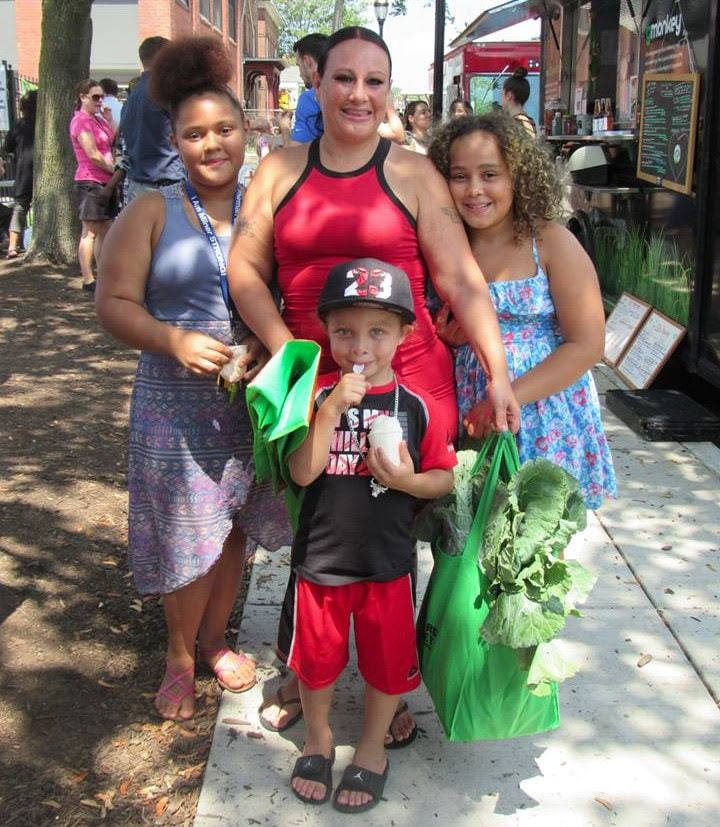BILLINGS FORGE COMMUNITY WORKS
|
When the Melville Charitable Trust bought the Lyceum building in Hartford, Connecticut, in 2003, it was making much more than a brick and mortar investment. The Lyceum, originally a gym and community center for immigrants, was located in Frog Hollow, an area near the Capitol District that was experiencing high rates of poverty, crime, and drug use, and low rates of home ownership. This purchase was a purposeful intention on the part of the Trust to go deeper with its mission, to explore in a direct way how its advocacy to end homelessness could be translated into preemptive actions to address its root causes.
The Lyceum evolved into a shared office space for nonprofits, including the Partnership for Strong Communities, a statewide housing policy and advocacy nonprofit founded by the Trust in 1998. “We purposely set out to create a hub of housing advocacy in Frog Hollow, a neighborhood located just blocks from the State Capitol but challenged by years of disinvestment,” explains Aimee Hendrigan, Vice President of Programs for the Melville Charitable Trust. Over the years, that hub has evolved into an ever more ambitious project. In 2005 the Trust made a second, larger investment in Frog Hollow with the purchase of Billings Forge, a property that had formerly housed Billings & Spencer, which made drop-forgings and others tools for the arms and sewing machine industries. The Billings & Spencer Company factory, located two blocks from the Lyceum, had shuttered in the mid-twentieth century, and the building had been converted to a mixed-income housing project. The Trust renovated the property along with six other derelict buildings it had purchased in close proximity. Today, the Billings Forge complex includes 112 residential units, 49 of which are designated affordable by HUD, meaning they will be permanently rented to very low income residents at a deep subsidy to market rate. Rehabbing the buildings and providing safe domiciles for its neighbors was the Trust’s first priority. Billings Forge Community Works was founded in 2007 to drive community participation and empowerment. A restaurant had occupied space in the Billings Forge complex for many years, and the Trust recruited Cary Wheaton, a Boston-based serial restaurateur who was running a kitchen incubator in Jamaica Plain, to help identify a new mission-aligned operator. |
A Community Works' December pop-up market in partnership with Hartford Food System provides food access to community members and a place for the community to connect. Right: Cary Wheaton, Executive Director of Community Works.
|
Growing into An Holistic Community Empowerment Approach
Cary knew first-hand how restaurants catalyze community transformation. “We started talking about restaurants as destinations, as employers, and as first investors in communities at risk,” Cary notes, recalling her conversations with the Trust’s dynamic then Executive Director Robert Hohler. “How people will come in for a meal from other parts of town and then their eyes are opened to an area they would never otherwise have stepped foot in.” Cary’s vision was aligned with the Trust’s own theory of change for Frog Hollow. “One of the Trust’s early theories,” Aimee further explains, “was if we could attract economic development to the neighborhood, create jobs, and bring in folks outside of Frog Hollow, that might help spark a thriving neighborhood of opportunity.” Cary spent the next eight months driving back and forth between Boston and Hartford in her search for the ideal restaurant operator for Billings Forge, but that person never materialized. “I had left the Jamaica Plain incubator and had a daughter in elementary school,” she recalled as she chatted in her office in the Lyceum, “but I realized that it was my calling to come here.” The Trust opened Firebox restaurant in 2007. “They were excited about what this vision could be,” Cary recalls. “This was their first community small business investment and they had never done anything like it anywhere else.” Under her management, Firebox became a profitable, farm-to-table destination, employing and training many local residents for jobs in food service. Billings Forge Community Works also began experimenting with other projects and, Aimee reports, “that is where the trial and error came in for us as a funder.” A cooking class for 4th graders turned out to be duplicative of other programs that were going on in the community. A computer lab that was opened in the community center with the goal of training neighborhood residents for jobs in the tech industry, did not succeed as planned. “It was awesome to give people access to a computer,” Cary acknowledges, “but it was unrealistic for us to think that access and a bit of training in Microsoft Office was going to get them jobs in the technology industry.” Homing in on the Leverage Point for Impact
Over time, however, Billings Forge Community Works began to home in on where it could have the most impact. Aimee elaborates: “What we found—and a lot of this was due to Cary’s experience and commitment—is that the most effective thing we could do as a funder was to help create jobs and job training opportunities so local residents could find an authentic career ladder in the community.” “We began to focus on activities where we knew we would have the most impact and make a real difference in the lives of people in the neighborhood,” Cary reports. “The programs that have worked the best are the ones firmly embedded in the skill set we have, in our core competencies—culinary job training, social enterprise and food access.”
So what was once a community center was converted into The Kitchen at Billings Forge, a social enterprise café and catering business. And in 2013 The Kitchen at Hartford Public Library was created in downtown Hartford as an additional job and entrepreneurship-training site. (Firebox is owned by the Trust and profits from it are reinvested into Billings Forge Community Works. The cafés are operated directly by Billings Forge Community Works.) |
The first cohort of youth (who are neither working nor in school) in Community Work's 12-week training program with Our Piece of the Pie and The Hartford Foundation for Public Giving. The program offers skill-building in customer service and food prep.
|
In 2008, Billings Forge Community Works also began operating a year-round farmers’ market and community garden. Combined, the two cafés, the catering business and Firebox train 30 Hartford residents yearly and employ 75 Hartford residents.
“Many of the guests at Firebox are people who live in the neighboring suburbs who might not have ventured into the city at all if it wasn’t for this award-winning restaurant,” says Aimee. “They are often served by folks who live in the neighborhood. They see it is not a charity but a functioning, high-end restaurant and surrounding it is also this social enterprise café. It is a way to get people in and see what can be done in a neighborhood that faces many challenges.” The Farmers’ Market, held on Thursdays in the summer and select days in the winter, is another opportunity for forging connections across communities. Corporations provide shuttles for employees to shop for fresh produce, and many linger at lunch tables, take a cooking class, or help plant the community garden. In 2013, the Trust sold its majority ownership in the housing portion of Billings Forge to the not-for-profit Preservation of Affordable Housing, retaining a minority stake. This has given the Trust the ability to apply even more of its resources to the culinary job training and food access programs run by Billings Forge Community Works. VIANCA CACERES' STORY Taking Down the Barriers
And as it has dived deeper into those efforts, the Trust has come up against the biggest barriers to career success for many Hartfordites living in poverty. Sixty percent of individuals in the Community Works’ training programs have a history of incarceration, addiction, or both. As a matter of policy, many corporate cafeterias in Hartford will not hire convicted felons. “One of the biggest ironies of this work and a huge complicating factor is that Billings Forge Community Works receives grants from corporations who believe in their work. Yet some of those same corporations won’t employ graduates or trainees because they have criminal or misdemeanor records,” Aimee reports. “As Billings Forge Community Works does more workforce development, these kinds of learning experiences have been invaluable to us and to our advocacy work.” While the Trust, through Cary, has been strongly encouraging local corporations to take a fresh look at hiring practices, it realized it needed to intervene earlier with job training, before young people turned to crime and drugs. The challenge was an urgent one in Hartford, where 6,000 young people between the ages of 16 and 24 neither attend school nor participate in the local workforce. In the fall of 2017, The Hartford Foundation for Public Giving awarded a joint grant of $250,000 to Billings Forge Community Works and an organization called Our Piece of the Pie (OPP) to institute a job training pilot for these “opportunity youth.” Under the terms of the grant, OPP recruits the youth for the program, and provides them with soft skills training. BFCW supplies culinary and entrepreneurship job training within their social enterprise businesses. Through OPP, students work toward a high school degree or a GED, some through single-parent programs or other support services. All earn stipends. First graduates of Community Works' collaborative 10-week entrepreneurship program with Our Piece of the Pie and The Hartford Foundation for Public Giving. The program offers Department of Children and Families (DCF)-involved youth who are still in high school the opportunity to gain valuable job readiness and life skills while creating products to be sold at The Kitchen.
The grant also established a 10-week entrepreneurship class for Department of Children and Families (DCF)-involved youth (ages 18-22) who are still in high school. The program allows them to gain valuable job readiness and life skills while creating products to be sold at The Kitchen Café. This first group created chocolate mint cookies and pumpkin spiced smoothies. Through its work in Hartford and Cary’s social justice and entrepreneurial passions, the Trust has assumed the role of advocate, not only to get the culinary industry recognized as a legitimate path to the middle class, but also for the dismantling of the barriers to that pathway for those in challenging circumstances. “It used to be that immigrants came here and food was the only way for them to grow into middle class lives,” Cary reports. “I don’t know if it is around race or class or gentrification or the dark side of the foodie world, but it has not been a way upward for people of color or for immigrants and that is a shame.” Traditionally, she also reports, most workforce job training dollars have been earmarked to jobs in the healthcare, manufacturing, and construction sectors, not to jobs in the culinary trade. But what if someone’s talents and passions lie elsewhere, she asks? “Workforce development policymakers tend to think that everyone in the food sector is going to end up working at Burger King. But there are lots of other jobs in the industry that pay well.” Head cooks and chefs in the U.S. earn a median salary of $43,000 versus the median of $44,668 for all full time salaried workers in the US and can earn considerably more as head chefs. |
Left to Right: Vianca Caceres, a graduate of Community Works' Culinary Training Program; Kezner Decordova, a current trainee; and Aimee Hendrigan, VP of Programs, The Melville Charitable Trust.
|
“The Melville Trust fully supports Cary’s work developing culinary career pathways,” says Aimee. “Some people will stay in the industry, others will go on to jobs in other fields. The culinary training should be seen as both an end in itself, but also as a means to an end, the opportunity to get job skills that is so important, especially for young people. We’ve seen the results and it’s something the Federal government should invest in more.”
Cary also hopes one day to see culinary schools established for those with backgrounds in poverty and/or a history of incarceration who would otherwise be unable to assume the mountains of debt required to access professional training. “It is about breaking stereotypes and realizing what will happen if we provide opportunities for those people who have not been traditionally given a chance to rise up in the ranks,” she reports, “instead of recruiting only the people who look like me or guys with man buns to fill those higher level jobs in the industry!” There is no doubt that the Trust’s efforts, initially focused just in Frog Hollow, are now benefitting the entire Greater Hartford region. Each year, 83 percent of their adult culinary job trainees are permanently employed after completing the program; Firebox now serves 85,000 customers a year; the catering business was voted “Best Business Caterer” by the Hartford Business Journal in 2017; and the overall complex has spurred investment in the Capitol area. “What we have done…besides job training…is provide employment for people who live here,” says Cary. “40-50 percent of our 75-80 employees come from the area or other impoverished neighborhoods in Hartford. We are trying to engage with people and provide them with a job, and if they are also provided with a healthy place to live, things start to change.” Aimee reports that although the Trust has sought community input at the programmatic level, it is now looking for new ways to bring the community into decision-making at Billings Forge Community Works. “The people that live here understand what’s needed better than anyone,” she notes. “ We want to make sure that they are involved in decision-making as the organization grows.” What about gentrification? “When we first invested in the neighborhood that was a concern but I don’t see that playing out yet,” says Aimee. “Things that have changed have been positive for residents. There is more commercial development on Capitol Avenue, some workforce development housing taking place in a huge factory about a block away; but it is development providing more for folks in the neighborhood, not pushing them out.” What sets the Trust’s work in Frog Hollow apart is the organization’s willingness to try new things and take some risks. “Much of that is due to Cary’s entrepreneurial personality, combined with the nonprofit sensibility,” says Aimee. “It’s is an attribute that you don’t always see in a non-profit. But it is one that others can certainly acquire.” |
